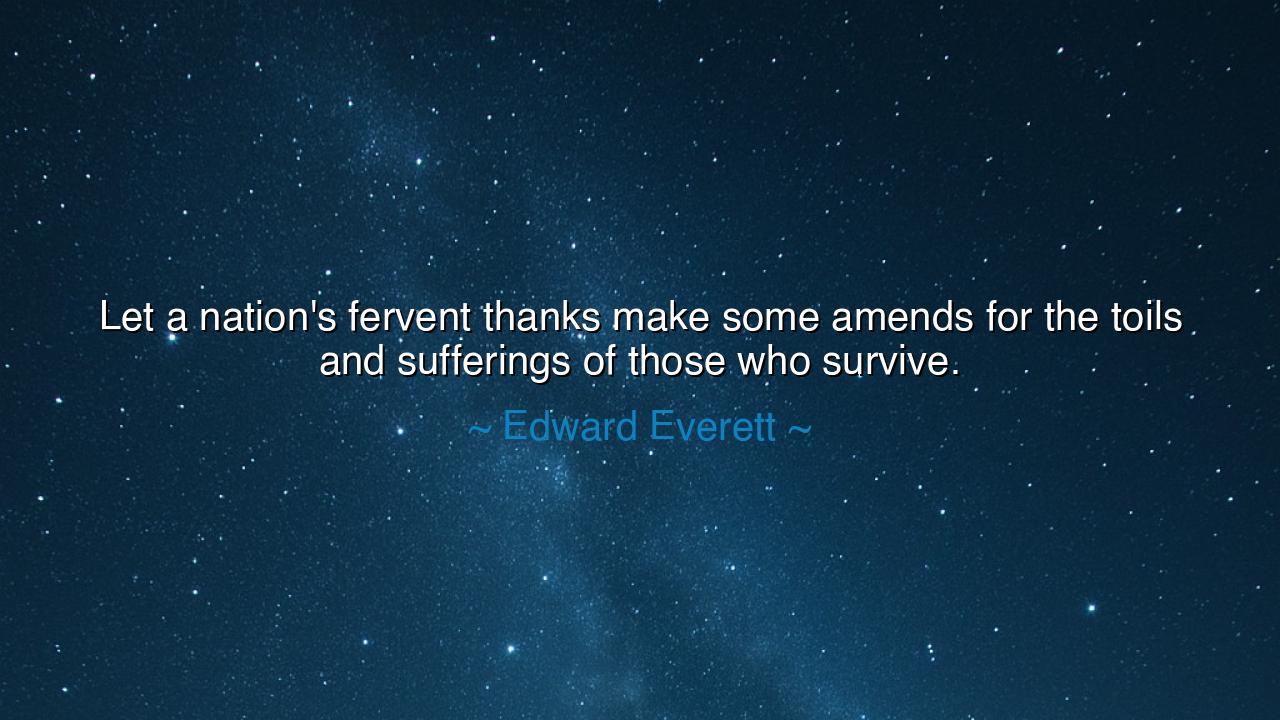
Let a nation's fervent thanks make some amends for the toils and
Let a nation's fervent thanks make some amends for the toils and sufferings of those who survive.






The words of Edward Everett, “Let a nation's fervent thanks make some amends for the toils and sufferings of those who survive,” rise with the solemnity of a trumpet sounding across the battlefield of memory. Everett, who spoke before Abraham Lincoln at Gettysburg, understood the sacred duty of the living toward those who had borne the unspeakable burdens of war. His words call not for silence nor indifference, but for fervent thanks, for gratitude so powerful it becomes an offering, a balm upon the wounds of those who gave their strength, their youth, and their peace for the sake of the nation.
To speak of toils and sufferings is to recognize that not all sacrifices end in death. Many survive battle — soldiers scarred in body, widows left in grief, children carrying burdens too heavy for their years. Their survival is not untouched victory, but an ongoing cost, an inheritance of hardship that continues long after the cannons grow silent. Everett calls upon the people, upon the whole nation, to acknowledge this price. Gratitude is not charity; it is justice. It is the recognition that survival after sacrifice is itself a form of martyrdom.
When he says, “make some amends,” Everett speaks the truth that no thanks can ever fully repay the debt owed to those who suffered for their country. But thanks, when sincere and fervent, is not nothing — it is healing, it is dignity, it is the acknowledgment that their pain was not in vain. The ancients knew this too. In Athens, after the battles that secured the city’s freedom, orators would stand in the public square to honor both the fallen and the living veterans. These speeches were not mere words, but sacred acts, a nation binding itself in memory and reverence to those who had borne its burdens.
History offers us countless examples. After World War II, when soldiers returned from the fields of Europe and the Pacific, many were celebrated as heroes. Yet beyond parades and medals, there lingered wounds — physical injuries, sleepless nights, memories that haunted. For some, the true healing came not from governments but from the gratitude of the people, who honored their service, welcomed them home, and acknowledged their sacrifice. Everett’s wisdom endures here: even if thanks cannot erase suffering, it can make amends by giving honor, comfort, and remembrance.
There is also in Everett’s words a warning. Nations that forget to give thanks to their defenders soon lose their moral strength. Rome, at the height of its empire, faltered when it neglected the very soldiers who had expanded its dominion, leaving them unpaid, dishonored, and disillusioned. Gratitude is not mere sentiment; it is a foundation of national survival. A people who cannot honor those who suffer for them will eventually cease to deserve the sacrifices made in their name.
The lesson for us is clear: gratitude is a sacred duty, not a casual courtesy. It must be fervent, alive, expressed not only in words but in deeds — in caring for veterans, in supporting their families, in remembering the cost of our freedoms. Gratitude is the bridge between those who sacrificed and those who benefit from sacrifice. Without it, the nation is divided; with it, the nation is bound together in shared reverence.
As practical action, let each of us take Everett’s words to heart. Speak thanks to those who have served, not once a year but often. Support organizations that aid survivors of war and hardship. Teach children the stories of sacrifice, so they may grow not in indifference but in reverence. Live each day conscious that the ease we enjoy was purchased at a cost. In this way, our thanks becomes not shallow, but fervent — a flame of remembrance that makes amends, however small, for the great burdens others have borne.
Thus Everett’s words remain as timeless counsel: let the nation’s thanks be fervent, for gratitude is the only offering worthy of sacrifice. While thanks cannot erase suffering, it can sanctify it, turning pain into legacy, and survival into honor. And in this, both the living and the dead are remembered with dignity, and the nation itself is preserved.






AAdministratorAdministrator
Welcome, honored guests. Please leave a comment, we will respond soon